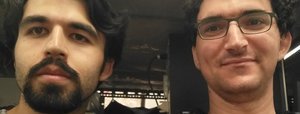This story was originally published on the Physics website.
With support from Xanadu, the Faculty of Arts & Science and the Department of Physics have established this $5,000 scholarship, which is awarded to one or more PhD students in the Department of Physics in recognition of the publication of a peer-reviewed article in an academic journal on a topic related to quantum information and quantum optics.
This award is the result of a donation of $25,000 over five years from Xanadu, a Toronto-based start-up company with close ties to the Department of Physics. A number of former post-doctoral fellows, PhD students and undergraduate students are affiliated with Xanadu and Xanadu continues to work with U of T Physics faculty through the MITACS Program.
Due to their current and past relationships with the University of Toronto, Xanadu founder and CEO Christian Weedbrook says “we wanted to encourage students in the field of quantum information and quantum optics and to let them know that Xanadu, and many other quantum startups in Canada, exist when they graduate.”
Application requirements include a peer-reviewed article on a topic related to quantum information and quantum optics and a cover letter explaining the significance of the paper in one or two paragraphs.
Batuhan Yilmaz and Noah Lupu-Gladstein shared the award this year for their publication "Negative Quasiprobabilities Enhance Phase Estimation in Quantum-Optics Experiment", published in Physical Review Letters. They are graduate students with Professor Aephraim Steinberg, a CQIQC faculty member.
The research students shared their thoughts on their award-winning research:
What inspired you to pursue research in this field?
We love science that wrestles with fundamental questions but also has clear applications to something concrete. A few years ago, some theorists brought this topic to our attention. At the time, they had just discovered the connection between quasiprobabilities and metrology, but their work wasn't constructive. In other words, they knew that this link had to exist somewhere, but they didn't know where to find it. Together, we came up with an experiment that would probe the connection directly. It was really rewarding collaborating with the theorists and the other members of our lab to bring the experiment to fruition.
How does your research impact the society we live in today?
One of the most exciting parts of metrology research is that it underpins so much we take for granted in modern life. How are you reading this text? Your device measured small changes in the frequency of light (invisible to humans) propagating all around us. How does your phone know your GPS coordinates? Several satellites triangulated your position using clocks that are so precise, they are sensitive to corrections from general relativity. Metrology isn't just about studying one of these incredible feats, but rather studying measurement itself. As a result, new results in metrology can find their way into a wide range of applications.
What impacts do you hope to make through your achievement?
In particular, our experiment demonstrates a new way of dealing with detectors that saturate. We are looking into the way our results could be used to make cameras that take sharp images, even in bright lights.

